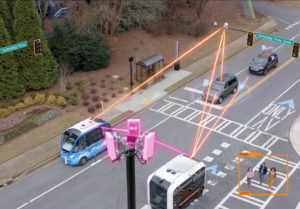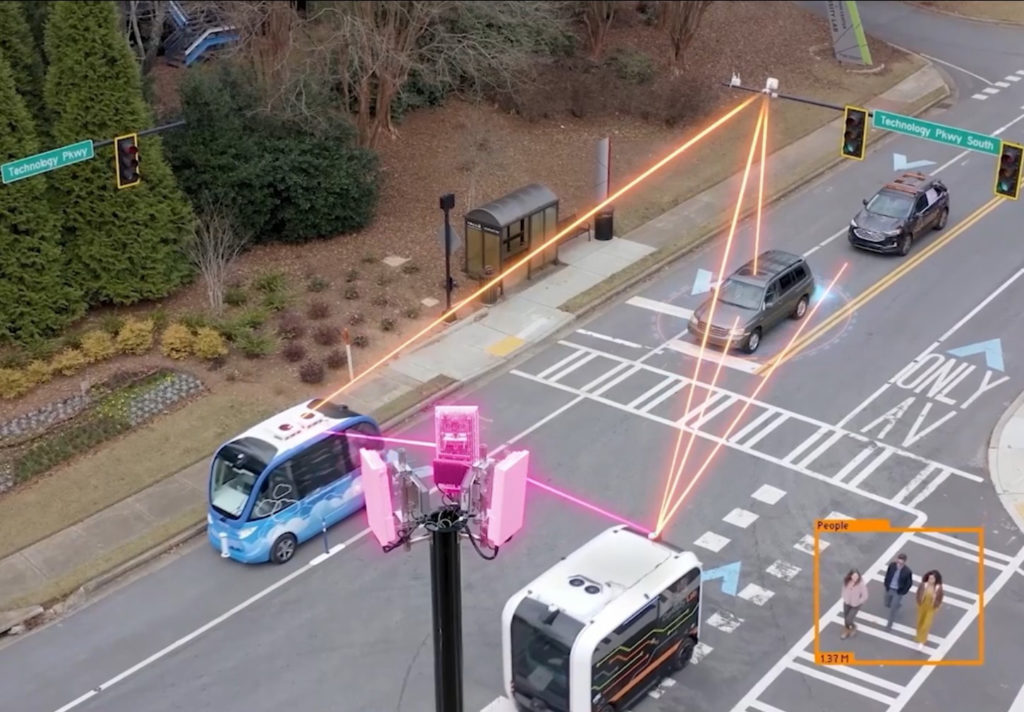
If you ask 15 city leaders “What is a smart city?”, you will get 15 unique answers. Or so Smart Cities Dive learned when they polled leaders in New York City, Dallas, Boston, Los Angeles and other major American metropolises.
However, if you read these leaders’ responses closely, there are several ‘smart city’ characteristics that are consistent across their definitions. According to these leaders, smart cities:
- Deploy interconnected IoT and edge devices to monitor the status of the city’s infrastructure and environment;
- Collect and analyze data to make informed decisions about city management; and
- Use the technology of tomorrow to improve the lives of residents and success of a city’s businesses today.
The City of Peachtree Corners and Curiosity Lab have been busy over the last several years transforming the city into a municipality that meets all of these requirements. For example, the city has installed a solar electric vehicle (EV) roadway, 5G-powered smart traffic signals, autonomous shuttles, environmental sensors, and more.
Below are descriptions of seven key pieces of Peachtree Corners and Curiosity Lab’s smart city infrastructure that benefit residents, businesses and organizations testing their technology at the Lab.
- Solar roadway system. Peachtree Corners and The Ray unveiled one of the first road surface-powered solar panels in a U.S. city that produces energy for a solar-powered EV charging station at Peachtree Corners City Hall. The Wattway solar roadway panels are located in a part of Curiosity Lab’s autonomous vehicle test lane. Learn more.
- 5G-powered traffic signals and smart infrastructure app. Peachtree Corners worked with T-Mobile, Applied Information and Temple, Inc. to introduce 5G-connected vehicle technology that enables smart traffic signals to communicate with any vehicle on the road via a revolutionary mobile app. Learn more.
- Cellular vehicle-to-everything (C-V2X) solutions. Jacobs, Peachtree Corners and Qualcomm Technologies have deployed C-V2X solutions focusing initially on roadside infrastructure, traffic management and road safety. As a part of the program, the city will work with Commsignia to feature roadside units (RSUs) equipped with Qualcomm Technologies’ C-V2X solution. Utility vehicles equipped with Qualcomm Technologies’ C-V2X solutions will also be utilized to demonstrate vehicle-to-infrastructure (V2I) direct communications. Learn more.
- Autonomous shuttle fleet. Peachtree Corners’ self-driving shuttle fleet operates along Technology Parkway and includes stops at popular destinations in the area such as hotels, restaurants, retail shops, the Curiosity Lab’s Innovation Center and City Hall. Learn more.
- Inseego 5G solutions. Inseego 5G solutions, running on T-Mobile’s Extended Range 5G and Ultra Capacity 5G network, helps power various use cases at Peachtree Corners. These applications include the management of autonomous vehicles, services, and drones; private networks for mission-critical city applications; and purpose-built solutions for industry 4.0 applications. Learn more.
- Visual communication & environmental sensor technology. Pole-mounted, high-brightness screens on Curiosity Lab’s autonomous vehicle test track share traffic-related updates, city announcements and other relevant information with Peachtree Corners’ residents and businesses. In addition, each platform is equipped with an environmental sensor board to detect and track environmental factors, such as carbon dioxide and other greenhouse gasses. Learn more.
- IoT control center. The first of its kind implemented in the United States, is where all of the deployed smart city infrastructure pushes invaluable data. Here, city managers can monitor and analyze the data.
Peachtree Corners and Curiosity Lab’s stable of smart city infrastructure will continue to grow as new technology is developed and new use cases identified by the industry.
Some of the next great smart city innovations may even come from companies testing their technology at Curiosity Lab! Testing is free and open to all technology companies from early stage startups to Fortune 500.
Learn more about Curiosity Lab’s testing infrastructure here.
